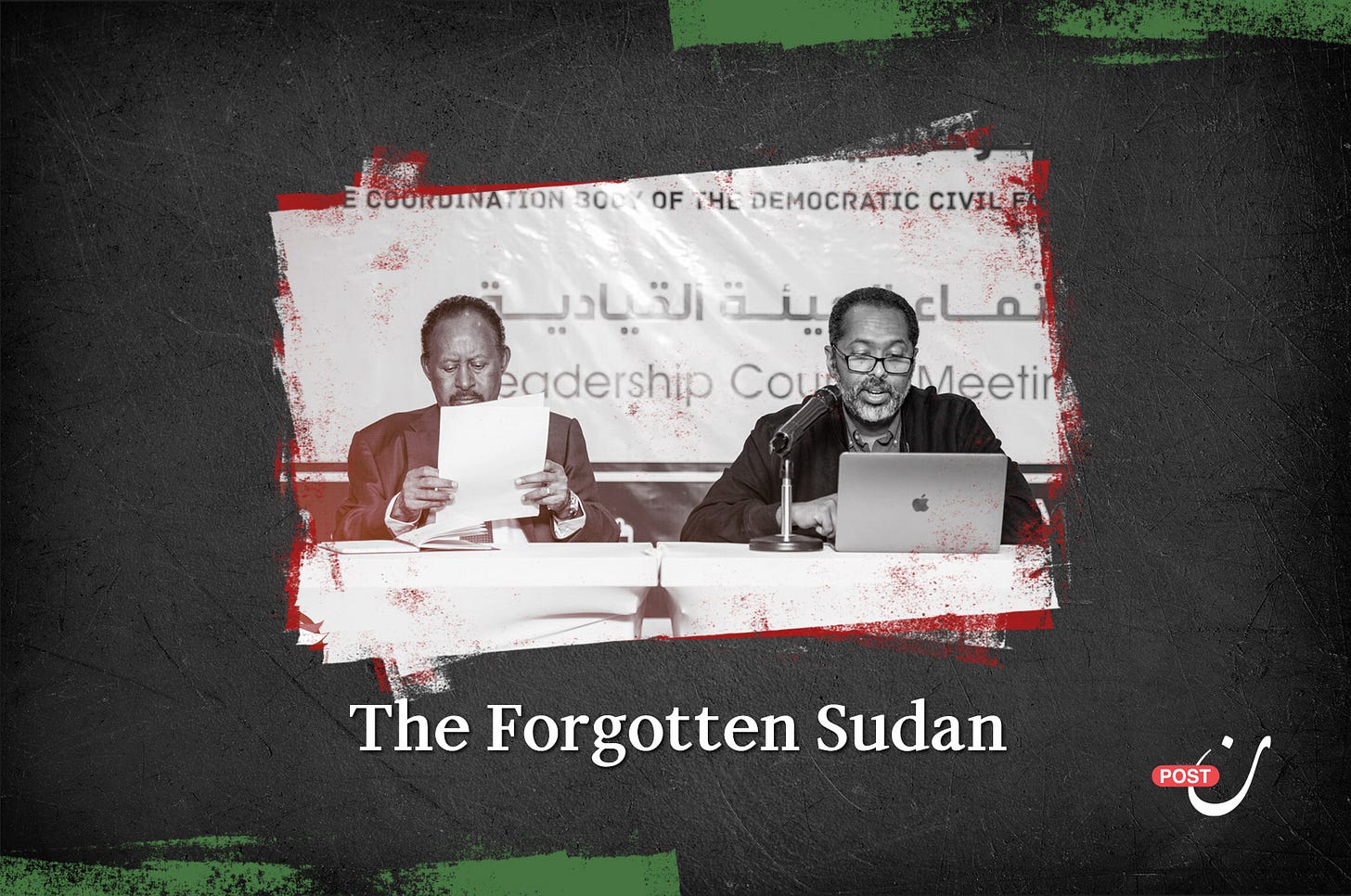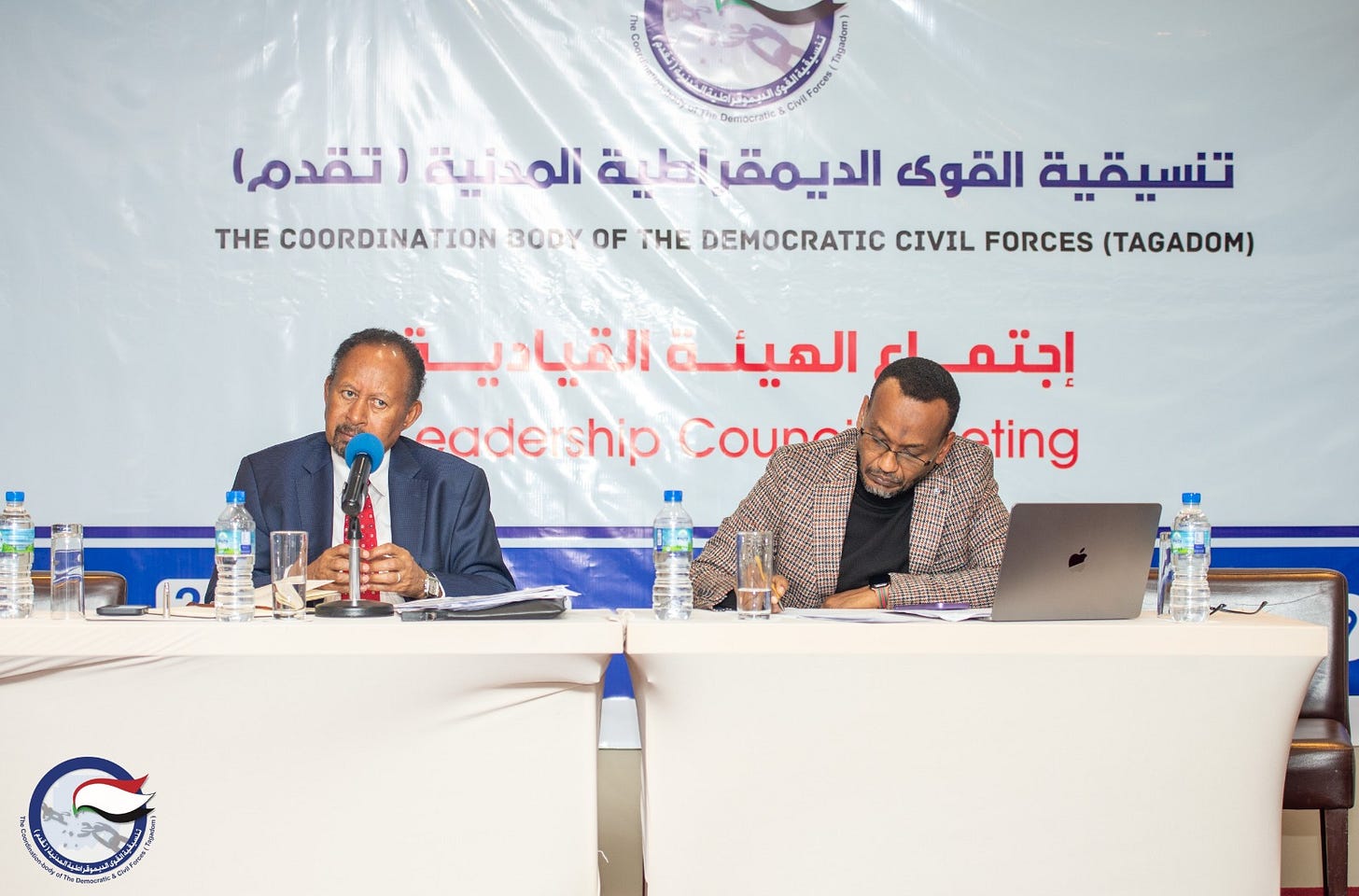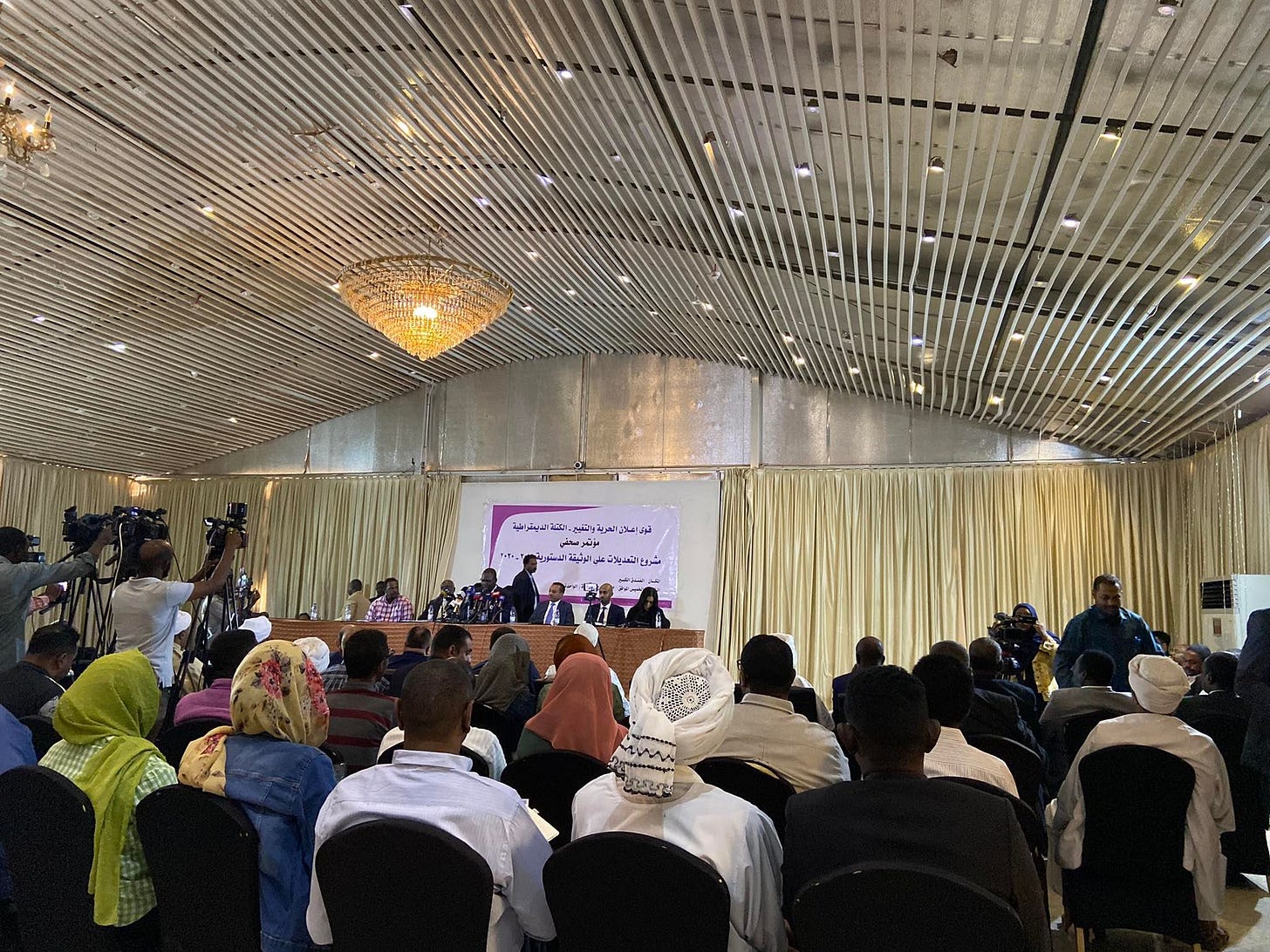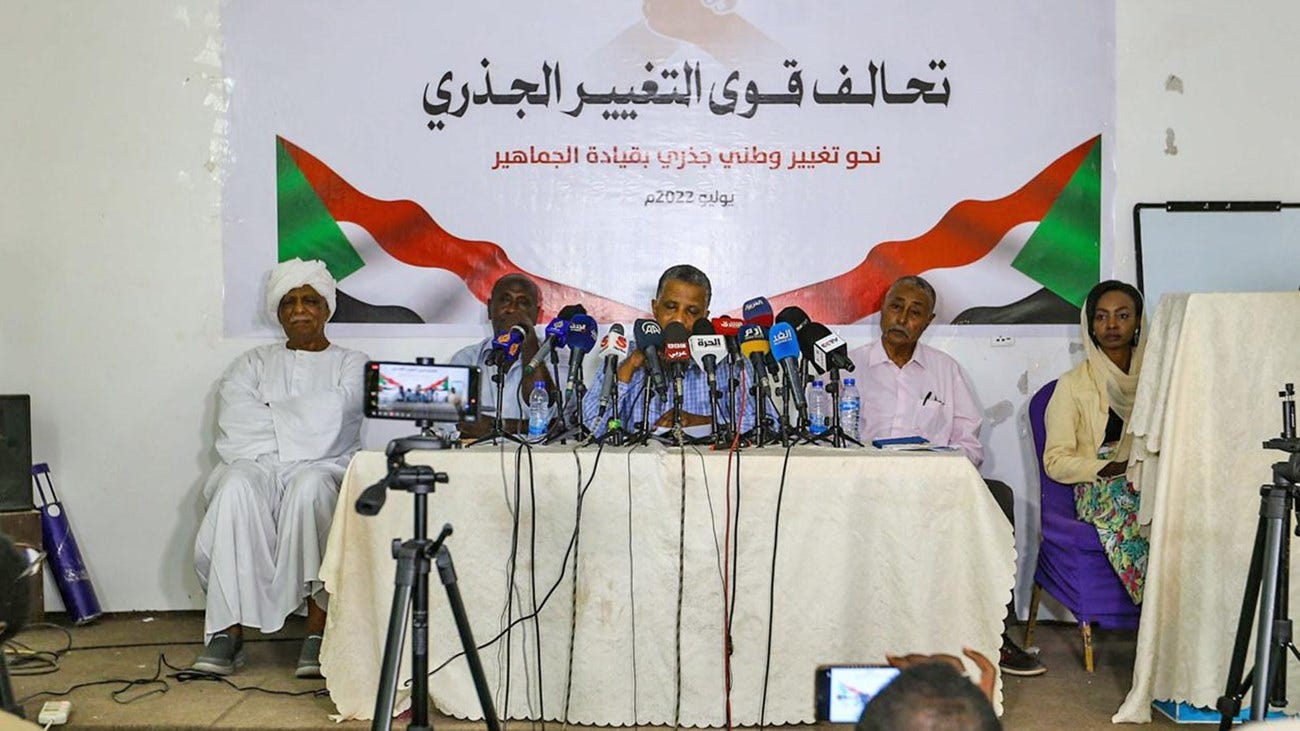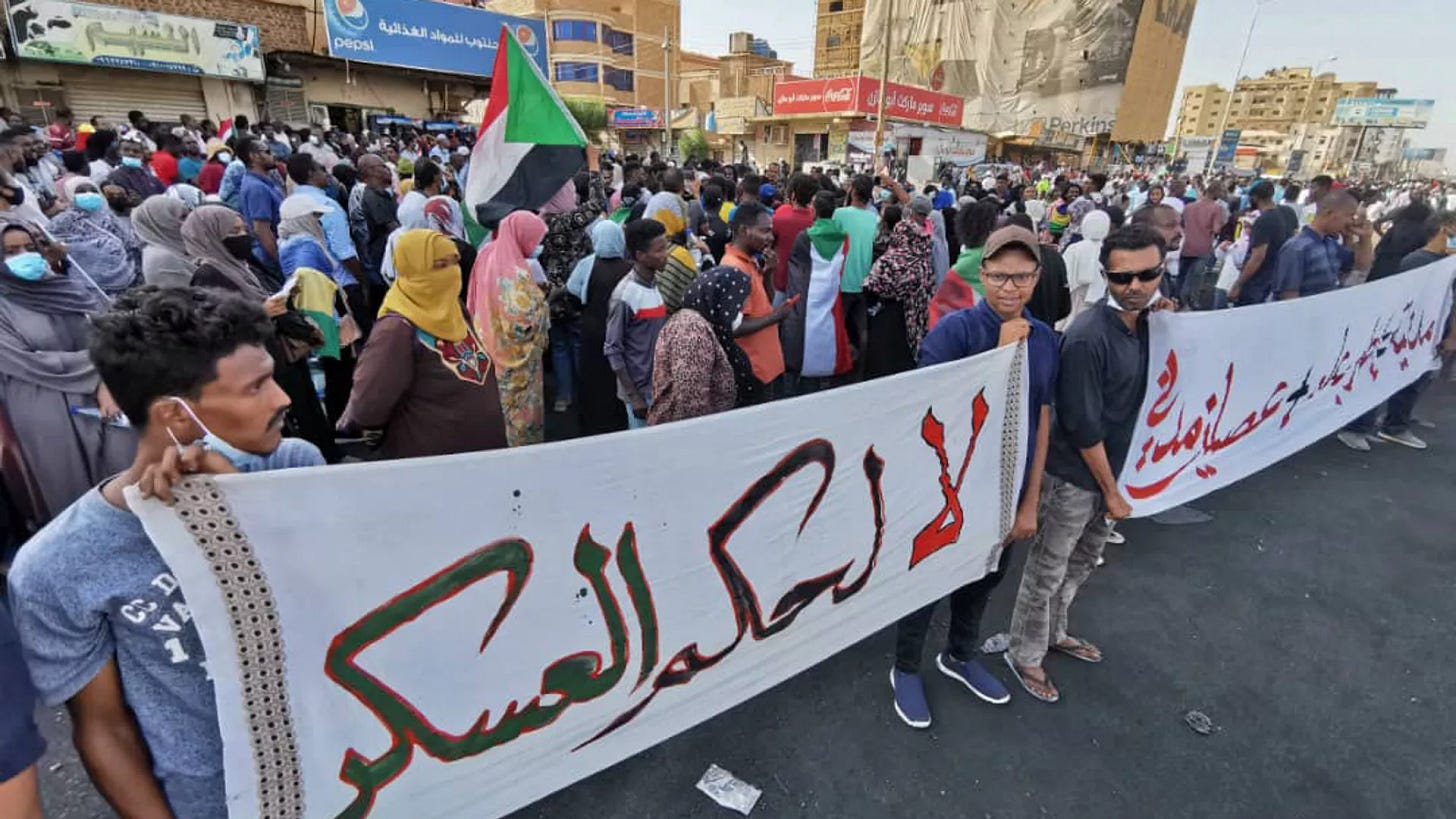The observer of the devastating war in Sudan recognises that the civilian forces are powerless to bring the parties to the conflict (the Sudanese Army and the Rapid Support Forces) into choosing the path of peace and this may be because the sound of battle drowns out every other voice.
But there are reasons of no lesser importance, related to some civilian actors backing one of the sides during the conflict, or as a result of the weakness afflicting these forces, or because of certain positions of theirs that have demonised them in the eyes of the populace. In this report we will get to know the most important civilian forces in Sudan, especially after the war of 15 April 2023.
Coordination of Civil Democratic Forces
The Coordination of Civil Democratic Forces (“Taqaddum”) is considered the foremost civilian alliance demanding an end to the war, and the transfer of authority to a civilian government capable of rebuilding the country. It anchors its programme in the path of democratic transition that the military (Army and Rapid Support Forces) derailed when they overthrew the civilian transitional government on 25 October 2021, with the support of some civilian forces and armed movements.
The coordination, led by the Prime Minister of the transitional government, Abdullah Hamdok, was formed in Addis Ababa, Ethiopia, in May 2023, a month after the outbreak of the conflict, with the aim of building a civilian front working to end the war in Sudan, avoid a scenario of full‑scale civil war, address humanitarian issues and the situation of internally displaced persons and refugees, fight hate speech, and plan reconstruction alongside ending the phenomenon of multiple armies and establishing a professional national army that does not interfere in politics and the economy.
The main backbone of the alliance consists of parties of the Central Council of the Forces of the Declaration of Freedom and Change (the political reference for the isolated civilian transitional government) (the National Congress Party, the Federal Union Gathering, the Sudanese Congress, and the People’s Movement – the Revolutionary Democratic Stream).
Notably, among the signatories of the final statement were the Armed Movements: the Movement for Justice and Equality led by Suleiman Sandal (a break‑away from the Justice and Equality Movement led by Finance Minister Jibril Ibrahim), in addition to the Two Movements for Liberation of Sudan the Transitional Council and the Gathering of Forces for the Liberation of Sudan led by El Hadi Idris and Taher Hajar, respectively.
After Idris and Hajar joined the coordination and insisted on keeping their forces neutral, General Burhan issued two separate decrees dismissing them from the Sovereignty Council.
“Taqaddum” issued numerous calls for meetings with the Army and the Rapid Support Forces, but only partially succeeded: it signed a “Declaration of Principles” with the Rapid Support Forces in Addis Ababa in January 2024 to work on ending the war.
During the agreement, Hemeti’s forces expressed readiness to cease hostilities immediately and unconditionally, negotiate directly with the Army, and form civilian administrations in areas under the forces’ control to restore normal life in war‑affected regions.
In contrast, the Army rejected meeting with Taqaddum’s leaders more than once, and accused them of collaborating with the Rapid Support Forces; in a military address to his soldiers in June 2024, Burhan declared: “No sitting, no negotiation with Taqaddum, which colludes with the Rapid Support Forces in killing Sudanese citizens.”
In April last year, the Public Prosecution charged Hamdok and a number of coordination leaders with “undermining the constitution and inciting war against the state,” crimes punishable by death.
Despite its repeated affirmation of its firm stance against the war and of maintaining equal distance from both sides, the coordination has become, for many, synonymous with the Rapid Support Forces perhaps aided by some of its statements and the rhetoric of its leaders, such as describing the Army and the Rapid Support Forces as “the two parties to the conflict in the Sudanese war,” a stance that supporters of the Army view as equating the national army with the militia which has the black record of violations.
The alliance accuses supporters of the deposed President Omar al‑Bashir of being responsible for the war by firing the first shot, amid new warnings of the growing influence of Islamists within the Army, following statements by the powerful Army general Yasser al‑Atta: “Truth must be said and many Islamists are with us.”
In contrast to Taqaddum’s accusations towards Islamists, the rival narrative accuses the Forces of Freedom and Change of being behind the war through igniting the rift within the military component by signing a framework agreement in December 2022 aimed at restructuring the armed forces and integrating the Rapid Support Forces into the Army.
In truth, the Islamists’ involvement in the war meant that many locals did not object to their return to the political space a matter that Taqaddum consistently refused in all its speeches and charters, which carry the phrase “all political forces except the National Congress.”
Also critiqued in relation to the coordination is its failure to act when the Rapid Support Forces reneged on its commitments in Addis Ababa regarding the cessation of violations against civilians especially in Al‑Jazira state while abiding by the clause on forming a civilian authority, which observers view as a pretext to pin the violations on it apparently aligning with the coordination’s desire.
Furthermore, the coordination is criticised for distributing its condemnations and directing its criticisms at both parties to the conflict, whether in their simultaneous or individual violations which amplified the sense among militia‑rejectors that there is a nexus between them and the alliance.
Finally, there was the incident of the boycott by the farmers’ representative in one of the coordination’s events when he protested the militia’s violations, and comments by the alliance leader Asma Mahmoud Mohamed Taha in Washington as reported by Radio Dabanga, stating that “political forces must be brave and face the Sudan’s real enemy the Islamists,” and according to the same source pointing to “the military and diplomatic victories achieved by the Rapid Support Forces against the Muslim Brotherhood and the ideologised Army.”
Moreover, suspicions continue to hover over the activities of many of the coordination’s leaders abroad. Some of them are in countries accused by the government of fueling the war and supporting Hemeti’s forces.
On the other hand, the heavy attack on Taqaddum highlights the alliance’s importance in the context of the ongoing war, and the alliance, if it succeeds in marketing its principled anti‑war position, could push the two warring sides to the negotiating table especially given the growing doubts among the populace about either side’s ability to deliver a military resolution.
Forces of Freedom and Change
The Forces of Freedom and Change The Democratic Bloc (FFC‑DB) is a key player in the current Sudanese political scene, and the bloc presents visions for unifying political forces without excluding any, in addition to supporting the Army in its war against the Rapid Support Forces.
The bloc was founded in November 2022, after reports of an imminent settlement agreement that would restore the military to civilian rule, after the October 2021 overthrow.
The alliance originally emerged from the National Accord Charter group, composed of breakaways from the Forces of Freedom and Change (the political reference of the isolated civilian transitional government).
At that time the dissenters called for dissolving the transitional government whose executive ranks include some of the bloc’s leaders, on the grounds of the ruling parties’ tendency to dominate power.
The military later used the protest at the presidential palace as one pretext among others to overthrow the civilian government in what was known as the “Corrective Path” operation which the civil forces and the international community regarded as a military coup. Bloc leaders endorsed the army’s move, and many remained in their executive positions under the plea of preserving the gains of the peace agreement.
The Democratic Bloc, which includes some of the movements that signed the Juba Peace Agreement, plus parties of weight such as the original Democratic Unionist Party under Mohamed Othman al‑Mirghani, and influential communal forces like the Supreme Council of Beja Tribes led by Nazir Mohamed Al‑Amin Turk.
The critique levelled at the Democratic Bloc is that it appears as a pragmatic alliance whose main objective is power even if by lending legitimacy to coups and wars.
Observers of the bloc note that it tends to move in opposition to the Forces of Freedom and Change movement: it opposed its presence in the transitional period citing dominance, it opposed it after the framework agreement on the grounds that it would restore the clock to pre‑25 October 2021, and today it opposes it in its anti‑war stance by supporting the Army and accusing Hamdok and his peers of being behind the war.
Thus, if the Democratic Bloc can overcome its differences with the Taqaddum coordination, and the two sides agree on a unified discourse regarding Sudan’s situation, that may represent a victory for civilians and for Sudanese whose lands the war has defeated them.
The Islamist Movement
The dissolved Islamist Movement (the religious reference for the deposed President Omar al‑Bashir’s regime) is one of the most prominent players in the Sudanese war, whether one likes it or not.
The Islamist Movement and its political arm, the National Congress Party, were dissolved by the transitional authorities and banned from political activity under the Law for the Dissolution of the 30 June 1989 Regime.
After a period of dormancy during which most of its leaders were tried on charges of coup‑plotting and corruption, the movement began organising demonstrations and events opposing the transitional government, focusing on critiquing the civilians and adopting a victimhood narrative regarding the transgressions against its membership especially by the Dissolution Committee, which the authorities delayed in forming appellate panels to review its decisions.
As expected, the Islamists backed the presidential palace sit‑in mentioned above, supported the Army’s seizure of power in 2021, and actively took part in demonstrations demanding the departure of the UN support mission for the Sudanese transition (UNITAMS). The movement has long been accused of involvement in the assassinations and targeting of peaceful protesters demanding civilian rule.
The peak of the Islamist Movement’s appearance in the scene came after the December 2022 framework agreement, with the emergence of hostile speeches against the agreement and its leaders, which included one Islamist demanding a fatwa to assassinate the United Nations Special Representative in Sudan, Volker Peters.
The Islamist Movement rejected the agreement as it “entrenches duality, is built on external will and desire, and endorses secularism,” all of which the movement rejects for many reasons, as its name suggests.
Islamist leader Naji Abdullah addressed the framework’s leaders in the local dialect: “We say to Volker and Burhan and Hemeti and Yasser Arman, by God this framework we will choke it and drink its water,” while Anas Omar challenged the movement’s opponents: “The Islamist Movement there is no bigger, there is no older, there is no cooler than it.”
With the Islamist‑backed Bara bin‑Malik brigade joining the fighting alongside the Army after the outbreak of hostilities, and the Army admitting the presence of Islamists on the front lines, accusations increased that the Islamist Movement fired the first shot that triggered the Army‑Rapid Support conflict, along with other charges such as returning to power through control of the Army, not least by being used as a pretext by the Rapid Support Forces to continue attacks on citizens under the claim of purging the country of remnants of the former regime.
On that basis, the Islamist Movement today stands between the accolades of citizens who suffered the Rapid Support Forces’ atrocities and the condemnations of those who see the movement active in a return to power via seizing military leadership, or even via coup as happened in June 1989. To get out of this tunnel, the Islamist Movement must conduct a review of its 30‑year tenure in power, and repudiate military coups.
Also, the Taqaddum coordination must present a more flexible stance toward Islamist organisations, provided those among them commit to democratic rules of the game especially if they have not been convicted of crimes against the homeland and honour during the Bashir era.
Radical Change Alliance
The Radical Change Alliance was formed on 24 July 2022 by political forces, trade unions and popular groups leading protests calling for the fall of the military regime and rejecting any settlements with its leaders.
The alliance is led by the Sudanese Communist Party (the spearhead of the left parties in Sudan), one of the Professional Forces Gathering factions (the spearhead of the revolution that toppled Bashir), and trade‑union forces chief among them the Union of the Farmers of the Gezira & Managil Project, the arbitrarily dismissed personnel from the police, and popular forces involved in protests demanding civilian rule.
In November 2020 the Communist Party announced its withdrawal from the Forces of Freedom and Change, protesting the military’s dominance of governance after the August 2019 power‑sharing agreement with civilians.
At that time the party opposed what it called leaders signing “secret and suspicious agreements inside and outside the country, steering the alliance toward the revolt’s overthrow and consenting to policies, charters and declarations agreed upon without transparency,” and after the war it called for the formation of “the broadest popular coalition to stop the war, reclaim the revolution, halt arrests and torture, improve living conditions and pay workers’ salaries.”
The Communist‑led alliance also urged Sudanese citizens to escalate their demands calling for the war to stop by all peaceful means possible, including marches, memoranda, sit‑ins and others.
The Radical Change Alliance’s stance appears more objective in the context of the war, which its leaders describe as “absurd,” but that same stance is strongly influenced by a mobilisation and mobilisation rhetoric, with the constant view of the Communist Party as a sectarian party of limited elite influence though likely to find resonance if it is adopted by more popular forces and political alliances.
Local / Communal Forces
One cannot deny the role played by the customary administrations in the context of the ongoing war in Sudan. Arab tribes in Darfur declared their alignment with the Rapid Support Forces, most of whose senior leaders come from their ranks, and urged their members to join the militia. In this regard the Rizigat and Messiria tribes of Arab origin stand out: they own large livestock herds and hold a culture that exalts fighting and bearing arms.
Nazir Mahmoud Musa Madbo of the Rizigat declared his early allegiance to the Rapid Support Forces, calling the current war an attempt to eliminate his tribe, while Nazir Tijani Abdel Kader of the Messiria in Darfur region declared his support for the Rapid Support Forces, standing with what he described as “our sons defending freedom, democracy and civilian transition.”
In view of the ethnically‑based crimes committed by the Rapid Support Forces in Darfur, the tribes of African origin, notably the Zaghawa and the Massalit, joined the joint forces that support the Army and are fighting fiercely to thwart the Rapid Support Forces’ attempt to capture the city of El Fasher, so as to complete their domination of Darfur region.
With the succession of military garrisons falling in the Central and Northern regions, the “infection” of tribal involvement moved to Nile State, where the Shura Council of the Jaaliin tribe announced shifting from backing the Army to demanding that the tribe take up arms to defend honour and the homeland.
In the East, which hosts the temporary capital (city of Port Sudan), the Supreme Council of Beja Tribes and the independent local units, led by Nazir Mohamed Al‑Amin Turk, declared their allegiance to the Army perhaps in the hope that the war will lead to a reconsideration of the power and wealth equation in the region, along with less significant reasons such as the support of some of the tribe’s sons serving in the Army and the Islamist Movement, around Mohamed Taher Aila, the last Prime Minister under the deposed Bashir era.
But these alliances notwithstanding, they did not prevent splits within the same tribe: for example, the head of the Mahamid tribe, Musa Hilal the cousin of Hemeti, to whom the Janjaweed forces in Darfur are attributed announced his joining the Army.
Also the Messiria tribe split after the Rapid Support Forces’ attempt to invade one of their key towns (city of El Babnusa), and the split was reinforced by the militia leadership’s conciliatory stance toward South Sudan’s ambitions in their dispute with Sudan over the historic Abyei region. As a result, the tribe split into “Blue Messiria” supporting Hemeti and “Red Messiria” fighting in the ranks of the Army.
Although one acknowledges the major impact of the communal forces in tipping the balance of power in favour of the main conflict actors, their alignments and splits could lead to a comprehensive civil war or war of everyone against everyone.
Resistance Committees
The Resistance Committees (popular entities in neighbourhoods organising protests demanding civilian rule) are among the most important civilian components in the Sudanese street lately, and the revolution that toppled Bashir rose on their shoulders. They twice forced the military to accept negotiation with civilians: after the dispersal of the General Command sit‑in in June 2019 and after Burhan’s failure for more than a year to form a government following the October 2021 power grab.
After the war began, the pages of the Committees turned into the voice of the people in regions affected by the war, and the members took on responsibility for running and operating most of the charity kitchens that provide free meals to those in need; for managing health‑care facilities and providing treatment through their pharmacies; and even for evacuating those wishing to travel to states unaffected by the conflict.
But like any faction affected by war, some members of the Committees chose to join one of the two warring sides, while accusations continued to haunt the others who remained neutral, of siding with one side or the other based on their stance toward the other.
In the areas under the control of the Rapid Support Forces, Committee members are prosecuted for “defaming the militia” through publishing facts about the force’s violations against civilians, while in Army‑controlled areas the same Committees are pursued on charges of “collaborating with the militia.”
The Committees can play important roles if they dedicate their effort to exposing the ugliness of the war, provided they present new leadership that replaces the repeated faces and mistakes of political personalities.


